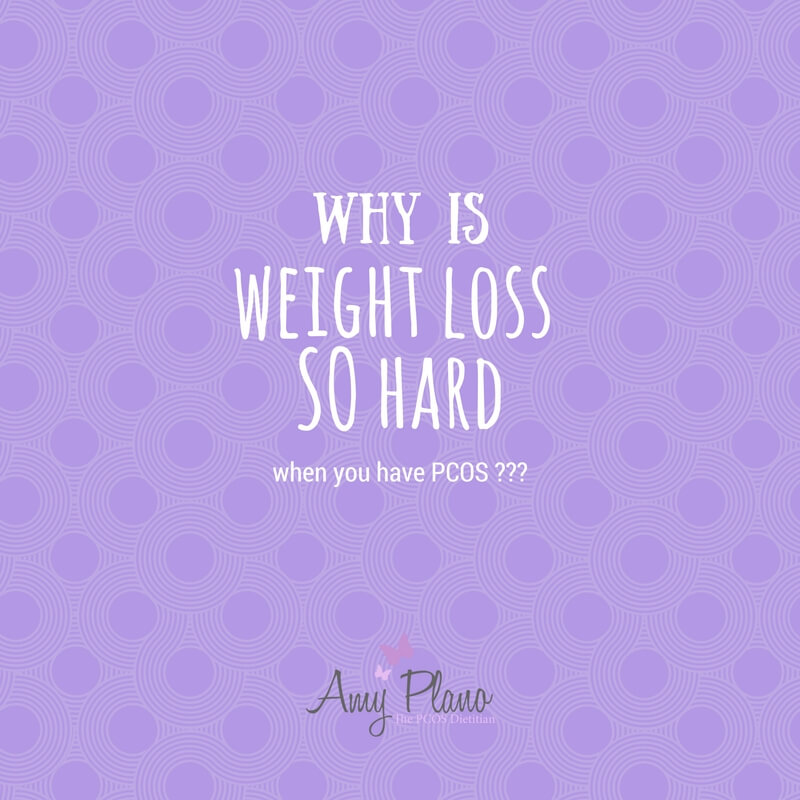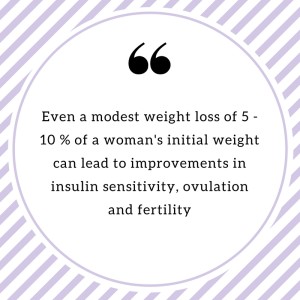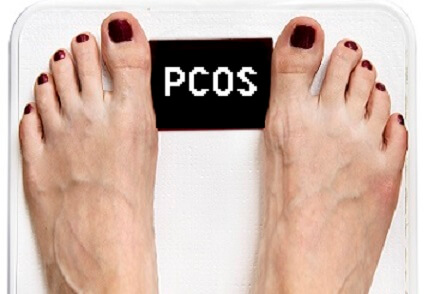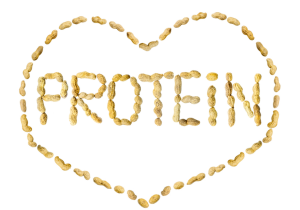Why Is Weight Loss SO hard when you have PCOS?
Did you know that weight loss can help with improving almost all the symptoms of PCOS? Even a modest weight loss of 5 – 10 % of a woman’s initial weight can lead to improvements in insulin sensitivity, ovulation and fertility! But, I know this is easier said than done. Weight gain and weight loss are two of the most common issues women with PCOS are forced to deal with.
But, what gives ? Why is weight loss so hard if you have PCOS? Well my dietetic intern Jackie Budlowski and I are here to lay the smack down and give the 411 of why the heck it so friggin’ challenging to lose weight when you have PCOS. Get your notebook out — these are some golden nuggets of information 🙂
Insulin
I truly believe insulin is one of the most important hormones in controlling weight! Your pancreas secretes insulin to regulate your blood glucose levels. In most individuals, insulin helps lower one’s blood glucose levels by shuttling glucose into the cells where it can be used for energy. However, most women with PCOS do not effectively process glucose. They experience what is called insulin resistance.Their bodies are less sensitive to the effects of insulin. In response, the pancreas dumps out even more insulin, leading to high insulin levels, or what is known as hyperinsulinemia.
High levels of insulin signal to the body that energy is abundant. In turn, rather than use the extra energy as fuel, women with PCOS store excess glucose as fat. Therefore, one of the biggest keys to controlling weight is to regulate blood sugar and control insulin levels. This is best accomplished through a moderate carbohydrate diet supplemented with the insulin sensitizing agent metformin.
If you are not already familiar with the benefits of metformin please read my previous blog post which will bring you up to speed.
Slow Metabolism
Women with PCOS have been shown to have a slower metabolic rate. This is based on many factors but the primary one being the amount of body fat women with PCOS tend to carry. Your metabolic rate is the number of calories you need for your body and organs to work. You see, body fat is what I consider metabolically “dead.” It does nothing for you but kind of just hang there.
Muscle on the other hand is very thermogenic. It burns more calories than fat does – even while at rest. In fact, muscle tissue is about 8 times more metabolically demanding than fat. A higher percentage of lean body weight (muscles) results in a higher metabolism compared to people of the same weight with a lower percentage.
If you have a slower metabolic rate, this means you must consume fewer calories than the average woman. Eating more calories than you burn can lead to weight gain. In future blog posts we will discuss some of the different ways to improve your metabolic rate (Hint – Hint : strength training is definitely one of them!)
If you are curious what your metabolic rate is and you live in the Connecticut area shoot us an email at amy.plano@yahoo.com. We can set up a time to test your metabolism. We have a device called the Bodygem which tests your metabolism by using a simple breathing device. The Bodygem is the “gold standard” of metabolism testing devices. Don’t believe us ? Click here bodygem validation to review the research. The cost of the test is $150.00. You must be fasted, with no caffeine or exercise for 4 hours before the test.
Appetite Hormones
There are a number of hormones involved with hunger and appetite control. Ones of particular interest for women with PCOS are leptin, cholecystokinin (CCK) and insulin. These hormones are responsible for signaling to the body to tell it that is it full and to “stop eating.” Research has shown that women with PCOS have altered hormone signals, which may lead you to feel constantly hungry even when you are consuming enough calories. This leads to overeating, increases in body fat and overall lower esteem. Not a winning combination for weight loss.
Leptin
Did you know that your fat cells produce hormones? This is one reason women who carry a significant amount of body fat often have hormonal problems. One of the hormones produced by your fat cells is leptin. This hormone sends a signal to the hypothalamus gland in your brain when fat cells are full. Due to the fact that cells produce leptin in proportion to their size, overweight women with PCOS also have very high levels of leptin.
Given the way leptin is supposed to work, women who are overweight and have PCOS should have a diminished appetite. But we know this is not the case. You can have a lot of fat making a lot of leptin, but it doesn’t turn the hunger valve off. The brain isn’t listening. No drop in appetite. In fact, your brain might even think you’re starving. This because as far as it’s concerned, there’s not enough leptin! So you get even hungrier. This condition is known as leptin resistance. This causes an up regulation of appetite. This supports why women with PCOS tend to constantly be hungry despite taking in an ideal amount of calories.
Cholecystokinin (Alias: CCK)
Therefore, it may come at no surprise that women with PCOS often feel less satisfied after a meal than women without PCOS. This can be attributed to the hormone cholecystokinin (CCK). CCK is responsible for telling your body you are full after a meal. Women with PCOS are reported to secrete less CCK in response to a meal. So, if your CCK levels are lower, this means you will be hungrier after meals despite just eating. It has also been speculated that impaired CCK secretion may play a role in the greater frequency of binge eating in women with PCOS.
Not so awesome, right ? But the plot thickens …
Insulin
Lastly, insulin also acts as an appetite stimulating hormone. You may already be familiar with the concept of insulin resistance and PCOS. If you are not click here to brush up on your knowledInsulin resistance occurs when there is a lot of insulin being produced (such as, with many women who have PCOS), but the body and brain have stopped “listening” to insulin’s effects. The scenario becomes : you eat, your body releases insulin, but your body still tells you to eat more. So you eat more and increase the likelihood of storing the food you do eat as excess body fat. And if this is not bad enough – you rarely feel satisfied.Therefore, high levels of insulin may be one of the many reasons why you may experience more hunger than other people. Higher hunger levels inevitably leads to more eating which results in weight gain.
Just because it is harder to lose weight, doesn’t mean it is impossible. Here are some tips on how to take the bull-by-the-horns and make your hunger hormones work for you!
Weight loss & PCOS: How to manipulate your hunger hormones for weight loss
Pump up the protein
Do your best to have protein at all meals, but especially at breakfast. Breakfast sets the “appetite tone” for the day! Therefore, consuming high-quality protein sources such as eggs, Greek yogurt or cottage cheese with some nuts will help reduce your hunger hormones and keep your appetite at an even keel throughout the day.
Skip the processed carbs (duh!)
Stay away from refined-carbohydrate-only meals and snacks such as cereal, a bowl of pasta, crackers, chips and starchy snacks. Even having a healthy snack such as fruit alone can trigger a spike and an immediate drop in insulin, so add some nuts, a piece of cheese or Greek yogurt to your fruit.
Focus on high fiber foods
Fiber is deeply tied to satiety. High volume, low-calorie, nutrient dense foods delay gastric emptying keeping food in the stomach for a longer period. Therefore, do your best to include foods such a vegetables, high fiber cereals, fruit and legumes to keep hunger at bay. The goal is aim for 25-30 grams of fiber spread throughout the day.
Eat a diet rich in omega-3 fatty acids to boost leptin
People who are overweight tend to release too much of a group of molecules that the body uses to combat inflammation. These molecules reduce leptin’s ability to communicate with the brain. They are thought to be one of the underlying causes of leptin resistance. Omega-3 fatty acids decrease the production of these molecules by reducing inflammation in the body. The body does not produce omega-3 fatty acid therefore you must get from the diet.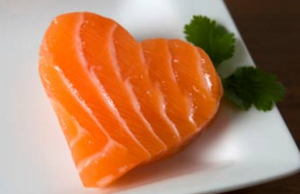 Foods high in omega-3 fatty acids include grass-fed meats, walnuts the fattier fish salmon, anchovies, sardines, mackerel, trout as well as chia seeds, flax seeds, summer squash and kale. Aim for about 800 – 1000 mg per day.
Foods high in omega-3 fatty acids include grass-fed meats, walnuts the fattier fish salmon, anchovies, sardines, mackerel, trout as well as chia seeds, flax seeds, summer squash and kale. Aim for about 800 – 1000 mg per day.
While the hormones that effect and control your hunger might be seen as complex, the three I’ve just discussed are keys to to unravelling this complicated web of PCOS, hunger and weight gain. As you can see, there are many factors at play, beyond just your determination to eat properly. These are factors I want you think about when you become frustrated with your PCOS and weight gain.What is important to understand is that your behavior around eating is not always something you can always consciously regulate.
Be confident and believe in yourself. Weight loss may initially be a struggle, but with the proper approach I am confident you can do it!

